Art & Exhibitions
The Art Collective MSCHF—Makers of the Viral ‘Big Red Boots’—Opens Its First Museum Retrospective
The group's antic-fueled art is now on view at Daelim Museum in Seoul, South Korea.
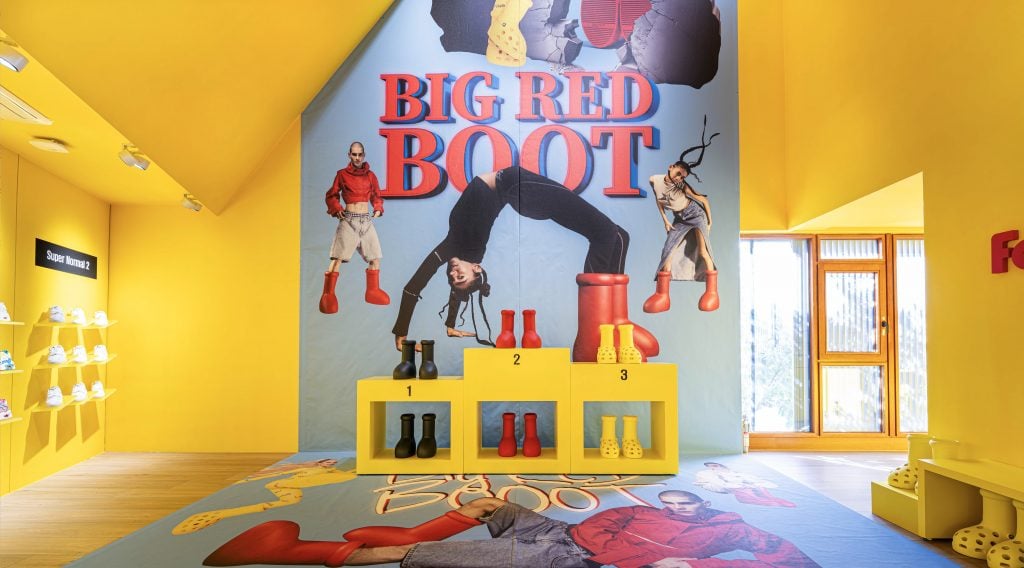
The group's antic-fueled art is now on view at Daelim Museum in Seoul, South Korea.

Min Chen

From big red rubber boots to a chopped-up Damien Hirst painting to an anime-themed tax filing software—the medium-spanning work of MSCHF doesn’t lend easily to pithy definitions. Rather, the Brooklyn-based art collective’s output has been aimed toward playfully unpacking structures that undergird our social, economic, and cultural realities—the absurdity of virtual aesthetics, say, or corporate greed.
As the group’s co-founder Kevin Wiesner told me over email: “MSCHF has always very much been defined by how it works, partly because we are aggressively agnostic about the literal physicality of what we make.”
In other words, some perspective is needed where MSCHF is involved. Happily, the collective’s first institutional retrospective has just opened at Daelim Museum in Seoul. Aptly titled “Nothing Is Sacred,” the showcase brings together about 130 works, including paintings, interactive games, and fashion objects, created by the group since 2016. However disparate, these so-called “drops” have emerged as strands from “a single practice,” said Wiesner.
“Looking at all of these projects grouped together, it becomes possible to tease out running themes and commonalities, but also to see the common process employed in making all of them in the first place,” he said.
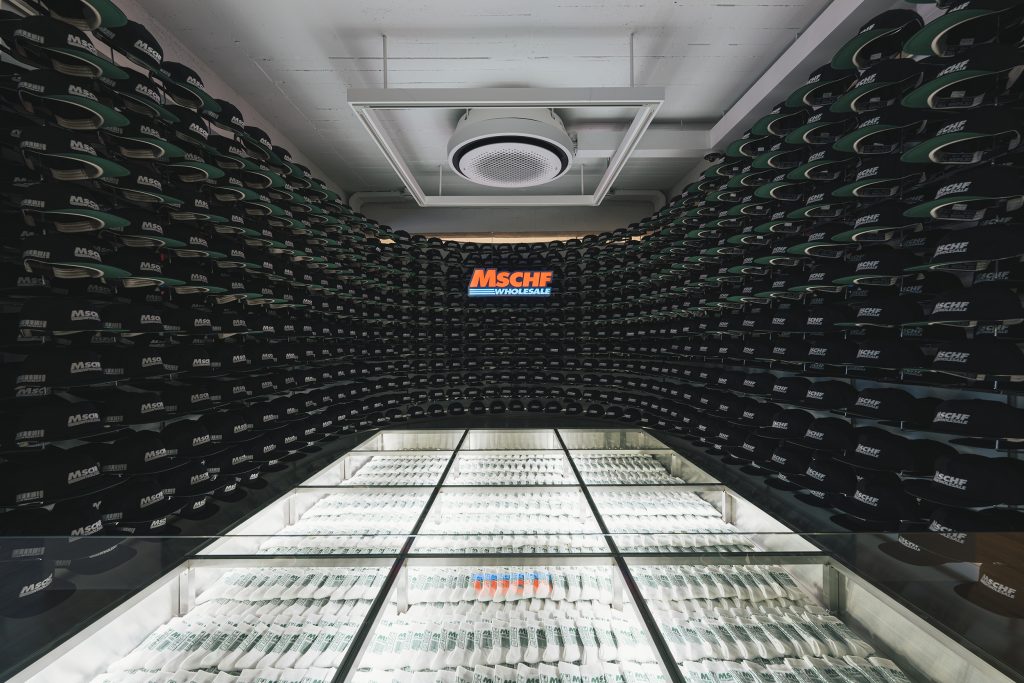
MSCHF Wholesale (2020) installation at “MSCHF: Nothing Is Sacred” at Daelim Museum. Photo courtesy of Daelim Museum.
At the exhibition, due space is given to MSCHF’s pieces such as its medical bill paintings, microscopic designer handbag, and large canvases of A.I.-generated feet. A sprawling installation is dedicated to MSCHF Wholesale (2020), its merch-making exercise that produced 1,000 pairs of socks and 1,000 hats, only available to buy in bulk, in a satire of drop culture.
MSCHF’s core principle, Wiesner said, takes off from Athletic Aesthetics. The theory, proposed by writer Brad Troemel in 2013 that artists today are cultural producers elbowing for airtime in an attention economy, has colored the collective’s craft as much as its extreme release schedule (once every two weeks). But another helpful way to view the group’s practice is as performance art, in which the audience serves as active participants.
“It is the behavior of the project in the world, the way people interact with and talk about the work, that is the totality of the piece,” explained Wiesner.
And MSCHF’s drops have had their intended effect. Works like Big Red Boot (2023) and ATM Leaderboard (2022) have gained traction across social media just as others have left IRL footprints. Satan Shoes (2021), for which MSCHF sold Nike Air Max 97s embedded with a drop of blood, brought a lawsuit from the shoe company and sparked what Wiesner termed “a miniature Satanic Panic”; while Severed Spots (2020), which retailed individual dots from a Hirst spot painting, bred its own resale ecosystem.
In this way, Wiesner offered that the retrospective is less art exhibition and more an anthropological showcase, bringing together as it does “artifacts of the performance, entry points into retelling the stories of each work’s existence in culture.”
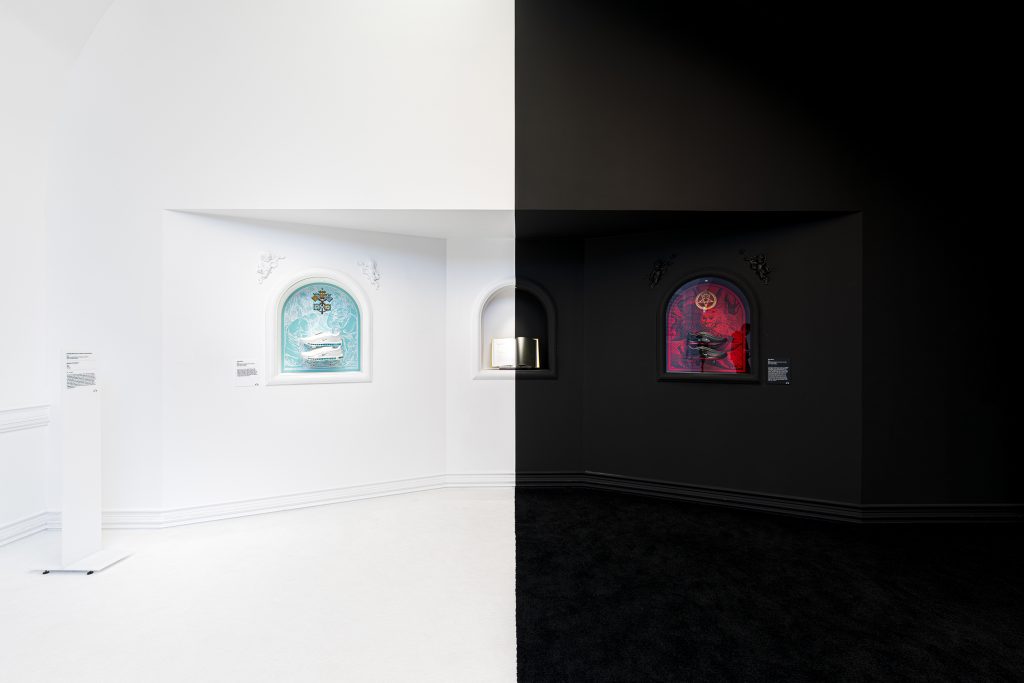
MSCHF’s Jesus Shoes (2019) and Satan Shoes (2021) on view at “MSCHF: Nothing Is Sacred” at Daelim Museum. Photo courtesy of Daelim Museum.
It’s a sentiment echoed by Daelim Museum’s curatorial director, Sabina Yeowoon Lee. In an email, she characterized MSCHF’s practice as “dealing with today’s zeitgeist… [with] sophisticated and witty manipulation to engage participants with their work.”
“MSCHF is defining a new generation of artists,” she added, “armed with… an unwillingness to be defined or categorized, a deliberate choice of controversial subject matters to push the boundaries, uniquely satirical viewpoints, and fast working athleticism.”
The Daelim exhibition follows MSCHF’s 2022 solo show at Perrotin, its first gallery outing, which signaled the art world’s embrace of its conceptual daring and cultural critique. But viewing almost all of the collective’s work under one roof at the retrospective, said Wiesner, offers the clearest picture yet of how its releases have grown in ambition and complexity.
What’s remained consistent though is the group’s abiding irreverence: “The show title ‘Nothing Is Sacred’ has been a MSCHF internal mantra for years,” Wiesner said.
“We hope that visitors will get a sense of the underlying sensibility and process that runs through the works in the show,” he added. “We also hope that MSCHF can act as a model for a particular type of making that foregrounds how the work lives in culture at large from the very beginning of the creative process.”
See more images from the show below.
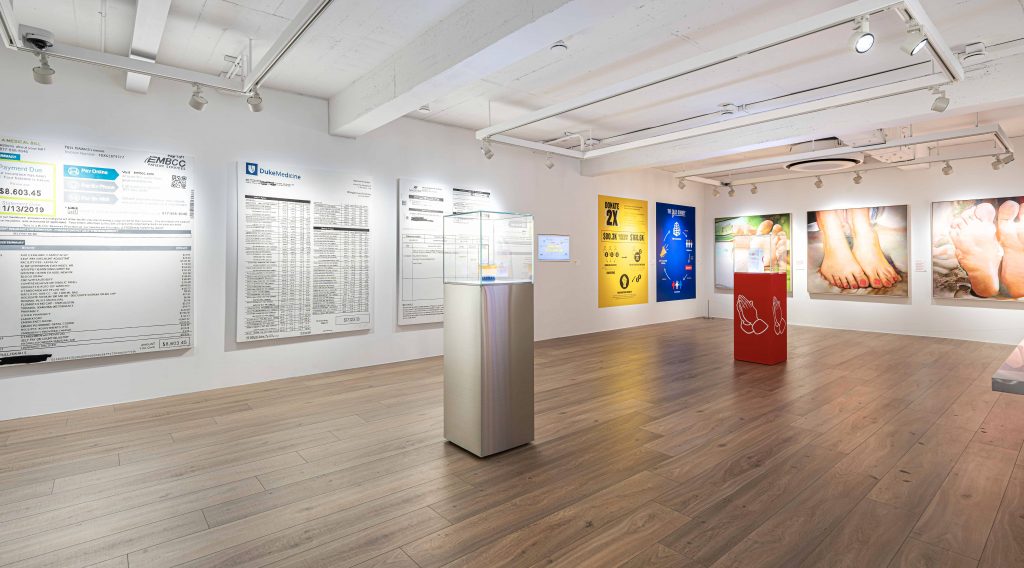
Installation view of “MSCHF: Nothing Is Sacred” at Daelim Museum. Photo courtesy of Daelim Museum.
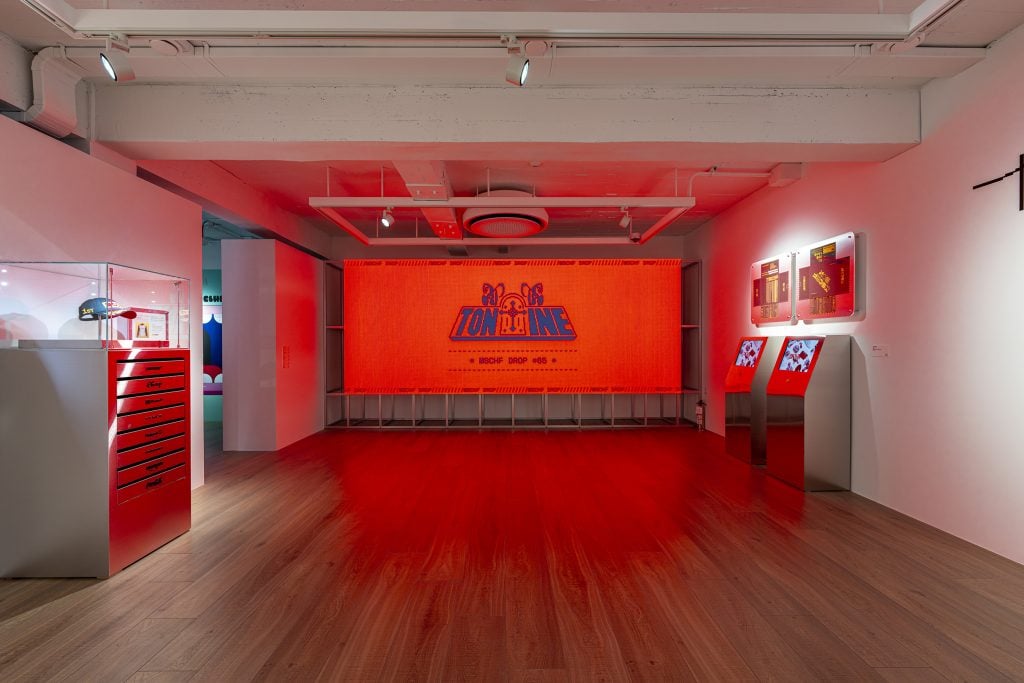
Installation view of “MSCHF: Nothing Is Sacred” at Daelim Museum. Photo courtesy of Daelim Museum.
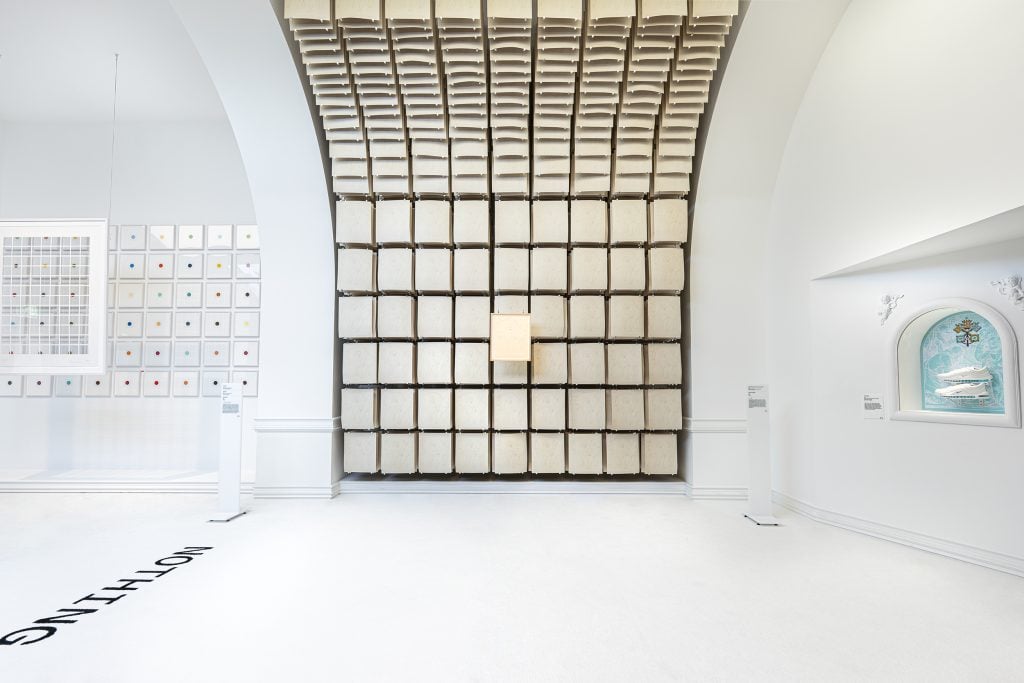
Installation view of “MSCHF: Nothing Is Sacred” at Daelim Museum. Photo courtesy of Daelim Museum.
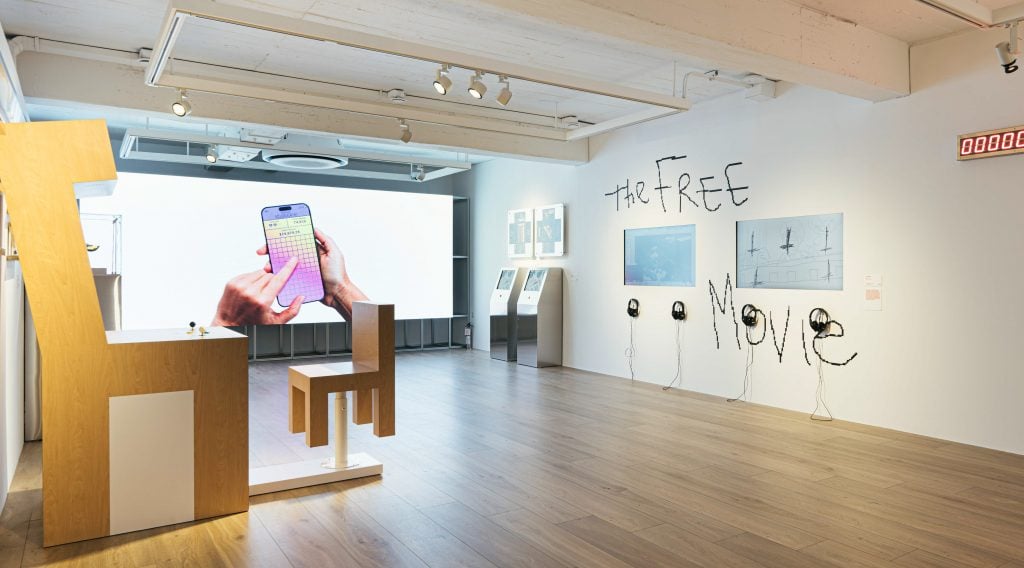
Installation view of “MSCHF: Nothing Is Sacred” at Daelim Museum. Photo courtesy of Daelim Museum.
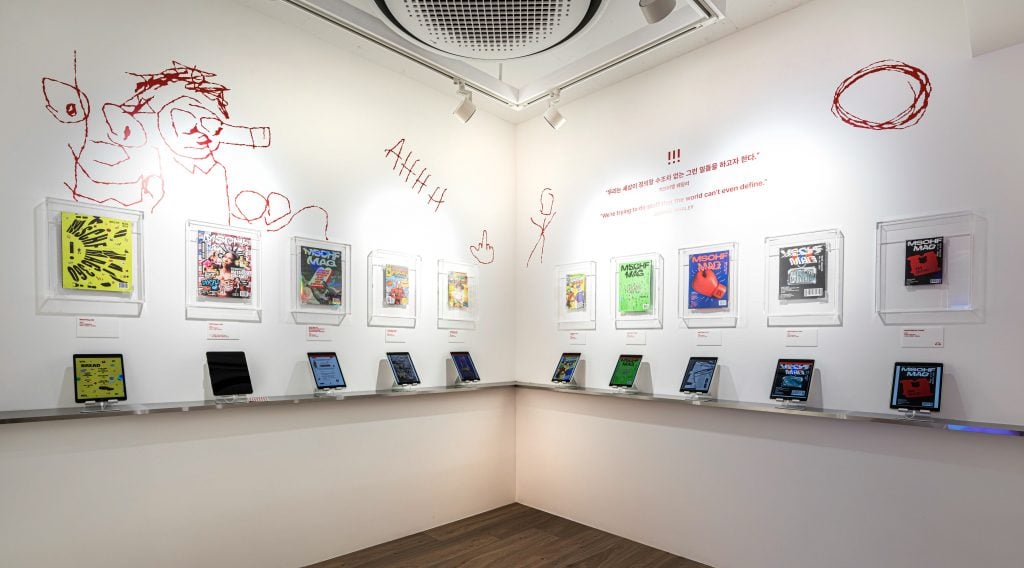
Installation view of “MSCHF: Nothing Is Sacred” at Daelim Museum. Photo courtesy of Daelim Museum.
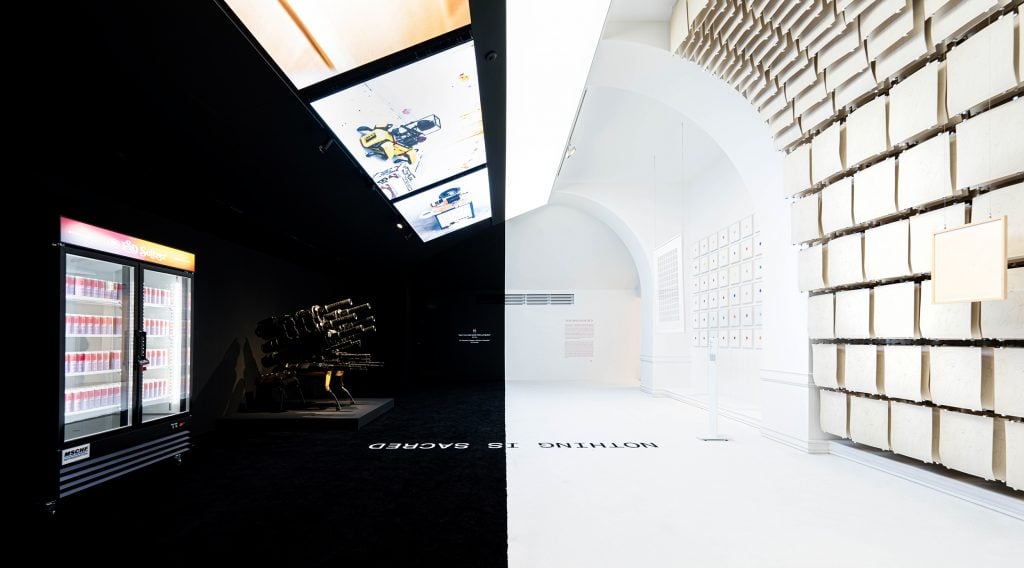
Installation view of “MSCHF: Nothing Is Sacred” at Daelim Museum. Photo courtesy of Daelim Museum.
“MSCHF: Nothing Is Sacred” is on view at Daelim Museum, 21 Jahamun-ro 4-gil, Jongno-gu, Seoul, South Korea, through March 31, 2024.
More Trending Stories:
Masterpiece or Hot Mess? Here Are 7 Bad Paintings by Famous Artists
Who Won Auction Week? Here Are 9 Takeaways From New York’s Nearly $2 Billion Fall Sales
Kurt Cobain’s Old Jeans Just Set an Auction Record for Levi’s
Seller’s Remorse: How a Thrift Store Owner Let a $191,000 Painting Slip Through His Fingers for $4
A Prankster Used A.I. to ‘Improve’ Edward Hopper’s Classic ‘Nighthawks’
Chinese Artist Chen Ke Celebrates the Women of Bauhaus in a Colorful, Mixed-Media Paris Debut
A Centuries-Spanning Exhibition Investigates the Age-Old Lure of Money
Meet the Woman Behind ‘Weird Medieval Guys,’ the Internet Hit Mining Odd Art From the Middle Ages